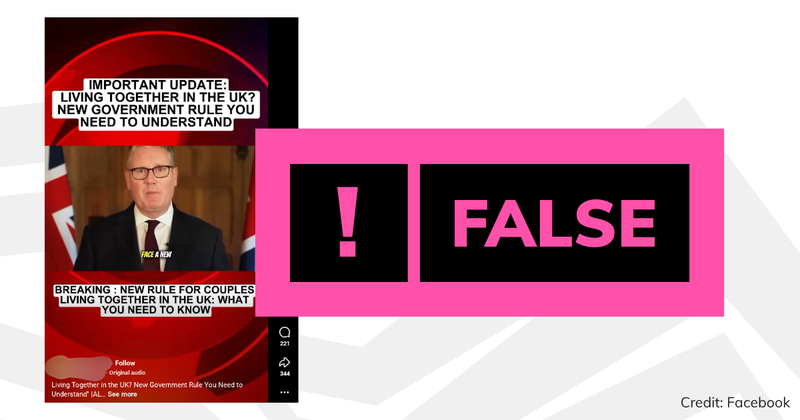We’ve spotted several videos circulating on social media claiming that a new rule means you’ll need to tell the government if you’ve been living with your partner for more than a year, or face a £2,000 fine.
But HMRC told us “these claims are completely false and designed to cause undue alarm and fear”.
Full Fact found versions of the claim shared on Facebook and TikTok, with one post viewed more than 1.4 million times.
They claim that if you’ve been living with your partner for over 12 months and haven’t officially registered your relationship with the government you will have to declare it. Those who don’t will supposedly face a £2,000 fine. Some of the videos claim the policy will take effect from 1 January 2026.
One video also claims HMRC and the Department for Work and Pensions (DWP) “now have the authority to check your tenancy papers, household bills and even bank records to confirm your living situation”.
It is already the case that in some instances couples need to confirm to the government if they’re living together to access certain benefits. For instance, if you are applying for Universal Credit, and you’re part of a couple as defined by the DWP, you and your partner will need to make a joint claim. The DWP counts two people as being in a couple if they live in the same household and are married to each other, in a civil partnership, or “living together as if they were married”.
In certain circumstances HMRC can also see taxpayers’ bank details. The new Public Authorities (Fraud, Error and Recovery) Bill, which aims to reduce the amount of money lost to benefit fraud and error, would give the Department for Work and Pensions (DWP) powers to check and recover money directly from benefit claimants’ bank accounts, if passed.
But there’s no evidence that all couples who live together are set to be required to declare their status, or that they’ll be fined if they don’t.
We have also contacted the DWP about these claims and will update this article if we receive a response.
This is the latest in a pattern of videos we’ve been seeing lately that describe fake new policies or rules, for example claims that the Prime Minister Sir Keir Starmer has announced a 32-hour working week in the UK from 2026 and that from October free cash withdrawals will end across the UK.
A recent Full Fact investigation found over a dozen TikTok accounts had been involved in sharing the videos. After we contacted the social media platform, it told us that all of them had been banned for breaching its rules, which do not allow “misinformation that could cause significant harm to individuals or society”.
It’s important to consider whether information you see on social media comes from a trustworthy and verifiable source before sharing it. Our toolkit provides some advice about how to do this.
